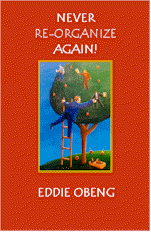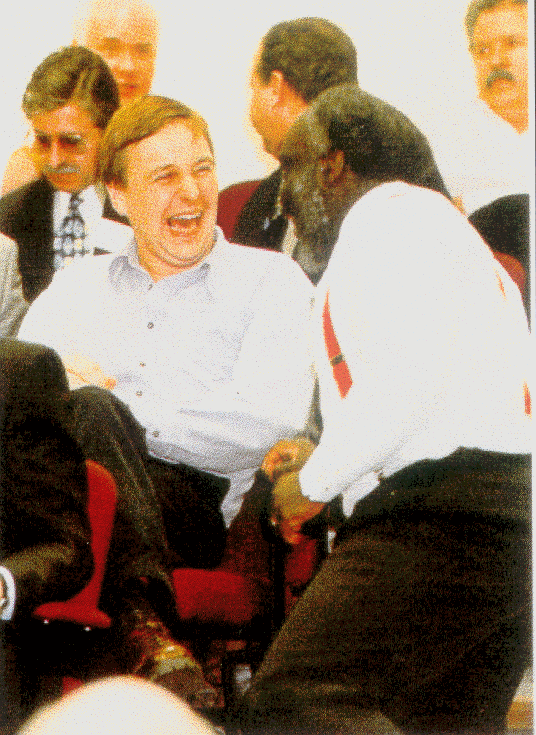Case studies here

Never Reorganise Again!
How to move beyond the Petronius Paradox
This book explains the thinking behind our approach and offers practical tips on implementation
Dr. Eddie Obeng at Pentacle the Virtual Business School has invented a New Organisation designed for the fast paced complex global New World. An organisation which self organises. Several of Pentacle The Virtual Business School’s clients have now implemented this New Organisation over the past six years with impressive results. This book is an introduction and a practical guide to reasons and methods for evolving your current organisation to be in line with the challenges and opportunities you face in your New World.
Buy the book from Amazon NOW! Watch the podcast of the book here Case studies here

The New World Organisation - Obeng’s OrganoWeb
Breathing life into your new organisation - Managing the transition to Obeng’s O-Web
About Pentacle The Virtual Business School
Ordering more copies of Never Re-organise Again
________________________________________________ Enterprises have always re-organised, adding change to a changing situation and creating chaos... rather than organisation! Gaius Petronius, writing at a time of rapid change in the Roman Empire, succinctly captured the frustration that re-organisation brings in its wake The Petronius Paradox. I call the dilemma described above The Petronius Paradox. Times of rapid change can wrong foot even the best planned organisation. People discover they have to work harder and learn new skills in order to meet the changing demands. This happens long before the enterprise itself realises the need for change. When the enterprise finally wakes up to altering its formal control mechanisms, the most dynamic and ‘on-the-ball’ individuals in the enterprise will already have learnt how to work around the constraints of an inappropriate system. The formal response may simply spoil its best people's good work. Its re-organisation of resources, reporting lines and responsibilities will disrupt everything that has already been achieved. And worse, because the reorganisation is often called for before the whole problem is understood it may actually not solve the issues it aims to. For many Executives the dilemma is not whether to re-organise but when. Failing to re-organise in time may place intolerable strains on your key people - too late and you may destroy the progress they have already made. The business pressures induced by powerful external shifts mount rapidly. The clamour to 'do something' becomes unbearable. Senior management need a quick win - something tangible, manageable and easy to accomplish. Re-organisation fits the bill exactly. This desire to do something may be bolstered from outside. Advice may be sought from external consultants or pollsters. They analyse the business environment, identify the organisation's strengths and weaknesses and highlight the need to move resources to seize the opportunities which are available. In short they propose a re-organisation. As we experience the effects of change we are tempted to add more, unhelpful change. I have noticed that this problem affects widely differing enterprises in the New World economy in a relatively consistent manner. This means that although businesses believe that they face individual and unique problems there is a strong similarity between both the problems and many of the solutions they need to adopt. Strangely, as they try to cope with change they ignore the second law of change, "Adding Change to Change creates Chaos" and simply add to the turbulence that they are experiencing closing an inevitable vicious cycle. Beyond The Petronius Paradox Unfortunately at the pace of change of the New World the ‘shelf life’(and implementation time) of any particular set of reporting lines is longer than the lifetime of the issue it addresses. All you can achieve with a conventional re-organisation is to chase your own tail, adding your own Petronius effect to the change around you. Strangely many Executives persist with this approach even though they know that on average re-organisation can close to double staff turnover rates and that there is no universal published correlation between re-organisation and subsequent business performance. This book is about moving beyond this paradox. It’s about moving in line and in step with the demands and requirements of the New World. Breaking free of the Petronius Paradox means you must answer when, how often and how to organise for a rapidly changing e-enabled world. The New World solution to the paradox is to organise - Now, Once, and Virtually.
Gaius Petronius, writing at a time of rapid change in the Roman Empire, succinctly captured the frustration that re-organisation brings in its wake... We trained hard to meet our challenges but it seemed as if every time we were beginning to form into teams we would be re-organised. I was to learn later in life that we tend to meet any new situation by re-organising; and a wonderful method it can be for creating the illusion of progress while producing confusion, inefficiency and demoralisation. |
And now the 21st Century version-We learnt fast to benefit from the opportunities around us and it seemed as f every time we were starting to form fixed habits around obsolete knowledge and working practices we would realign ourselves our teams and our networks. I was to learn later in life that by building enjoyable and trusting relationships aligning with shared dreams and making sure that information needed is provided and by working with a wide range of people I could achieve fulfilment in my role and ensure that the enterprise was robust and effective. |
________________________________________________
NEW WORLD ORGANISATION: From Organogram to OrganoWeb
The New World of business is now fully upon us all. Leaders of organisations are coming to recognise that the New World extends well beyond the publicised and high profile e-activities and ‘dotcoms’ to all their internal and external activities. They are beginning to realise that the speed of change, levels of complexity and the speed of information have irrevocably altered the businesssphere of operation.
So, the challenge - speed, agility, developing new capabilities, retaining talent, global virtual teaming, intelligent products, mass customisation of customer relationships, reach.
The solution - new business models, use of cyberspace, especially the internet, local involvement of global leaders, new offerings delivered in new ways to new customers, 24*7*365*World-wide - business empires on which the sun never sets, clicks and mortar - marriage of touchspace and cyberspace. Altogether exciting, new and untried,
The paradox - how to stay in control in a business environment which demands that you create new ways of operating which no one yet fully understands. The simplest way to understand the paradox is through an ‘odd-one-out’ quiz.
Which of these is the odd-one-out?
1. run a formula one car using a steam engine
2. power a Boeing 737 with a water wheel
3. run a notebook computer using transistors
4. fuel a laser-guided smart bomb with gunpowder
5. drive the screen of a palm pilot using valves
6. organise a new world global business model using a 100 year old
command and control hierarchical structure
Did you guess right? Most people guess that number six is the odd-one-out. But why is it the odd-one-out?
The reason - not because it’s funny, not because it’s obviously the only one related to the topic being discussed here, not because it’s the only one which spills onto two lines of text, but because it is the only one out of the six which we actually try to do!
Because we are aware that there is an anomaly, a significant amount of academic thought has gone into rethinking how enterprises and businesses should organise their people . However, in reality, there is little evidence of enterprises actually changing their traditional approach.
But it is not just because our thinking on how to organise is old that we need to reinvent it. There are a number of other reasons......
Watch the podcast of the book here
Case studies here
About the Author
________________________________________________
Dr. Obeng is Founder Director of Pentacle The Virtual Business School (1994), one of the world’s most innovative e-learning businesses. He was previously an Executive Director at Ashridge Management College, having begun his career with Shell. Describing his books, The Daily Telegraph said, ‘He has a back-list of book titles in a style far removed from the ponderous approach of most management tomes’. As the author of a series of books that describe his philosophy for managing in the New World; New Rules for the New World, All Change! The Project Leader’s Secret Handbook, Putting Strategy to Work, Making Re-engineering Happen, SoundBytes, Achieving Organisational Magic and Cybersense, he writes on the full range of management topics. He is also a major contributor to the Financial Times Handbook of Management and The Gower Handbook of Training and Development. In the Financial Times he was described as an ‘agent provocateur’ and a ‘leading revolutionary’. Human Resources magazine named him as a ‘rising guru’ and a ‘man to watch for the Millennium’. The Daily Telegraph described his as the ‘Max Headroom’ of the business school world and ‘unusual to back his own ideas with his own money’. And The Sunday Times described his Pentacle The Virtual Business School as ‘one of the few which combine continuous learning with remote management’. Eddie regularly presents his New World philosophy concepts and success stories to large audiences. His presentations have been described as ‘As energetic as Tom Peters but not as long...’ Human Resources Magazine
I want to buy this book from Amazon NOW
Watch the podcast of the book here
Case studies here
I want to learn about other books by Eddie Obeng
I want to buy other books by Eddie Obeng




